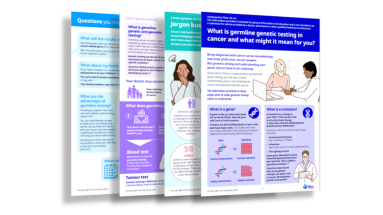Genetic testing – support and guidance
What is a Genetic Counsellor?
A Genetic Counsellor is someone who specialises in genetics and inherited diseases (those passed to you from your parents).1 Your GP will arrange for you to see a Genetic Counsellor if they think there is a gene in your family that increases your risk of getting cancer. They will ask you about your family history of cancer, for example who in your family has had cancer:1,2
- What type of cancer did they have?
- What age were they when they had cancer?
- How are they related to you and each other?
They can use your answers to decide how likely it is you have inherited a gene making you more at risk of getting cancer. If they think this is likely you may be offered a genetic test.
You can talk to your Genetic Counsellor about the upsides and downsides of getting tested, and ask them all your questions, so they can help you make the best choice for you.
How do I decide whether to have a genetic test?
There is a lot to think about when deciding whether to have a genetic test or not. It is easy to feel worried and overwhelmed. You may want to talk it through with your family, friends and your Genetic Counsellor.2
Before you decide whether to have a test, it can help to think about these questions:2
- How do I feel about having a test?
- Who can I talk to about having a test?
- Do I want to know if I have an increased risk of getting cancer?
- What will I do if my result shows I do have an increased risk of getting cancer? Is there anything I can do to stop getting cancer?
- Will I feel better if my results show I do not have an increased risk of getting cancer?
- Who else might be at risk in my family?
When it comes to deciding whether to get a test, there is no right or wrong answer. It is your choice and talking to your family, friends and Genetic Counsellor will help you make the best choice for you.
What is the impact on my family and how do I talk to them about genetic testing?
Talking to your family about genetic testing can be hard. It may bring on lots of emotions. Be prepared that even if you have decided a test is the right thing for you, they may not feel the same way.2,3
The results of your test can have a big effect on your family. If you have a positive result, other family members could also have the same change to their gene and be at a higher risk of getting cancer themselves. This means they will then have to decide whether they want to have a genetic test.3,4
You may find different family members react in very different ways. Some might be grateful you have told them and want to get tested themselves. Others might choose not to.4
Talking through your choice to get tested, or your test results, can be helpful. They can then support you and be included in making any difficult decisions that might come up in the future. Talking openly can be the best way to understand each other’s feelings and move forwards as a family.4
If you are worried about telling your family about getting a test or the result of your test, talk to your Genetic Counsellor. They can help you work out the best way to do this.4
If you have any questions, speak to your GP or Genetic Counsellor who will be able to give you more guidance.
References
- Macmillan Cancer Support. Genetic counselling? Available at: https://www.macmillan.org.uk/cancer-information-and-support/worried-about-cancer/causes-and-risk-factors/what-is-genetic-counselling. Accessed: October 2024.
- Cancer Research. Genetic testing for cancer risk. Available at: https://www.cancerresearchuk.org/about-cancer/causes-of-cancer/inherited-cancer-genes-and-increased-cancer-risk/genetic-testing-for-cancer-risk. Accessed: October 2024.
- Macmillan Cancer Support. Genetic testing for cancer. Available at: https://www.macmillan.org.uk/cancer-information-and-support/worried-about-cancer/causes-and-risk-factors/genetic-testing. Accessed: October 2024.
- Cancer Research. Getting your genetic test results. Available at: https://www.cancerresearchuk.org/about-cancer/causes-of-cancer/inherited-cancer-genes-and-increased-cancer-risk/getting-your-genetic-test-results. Accessed: October 2024.










